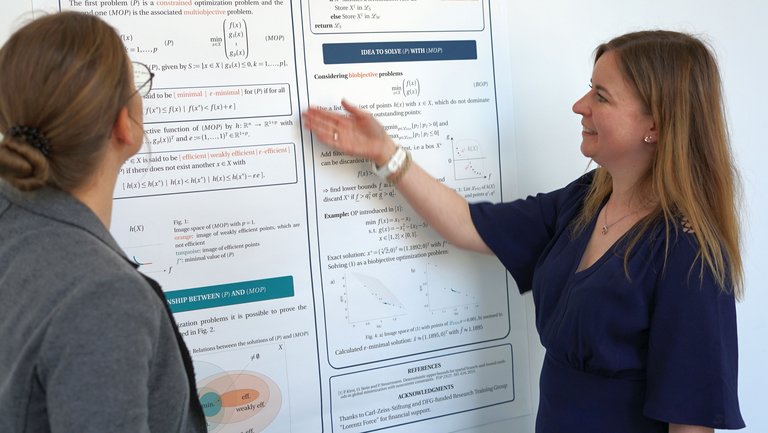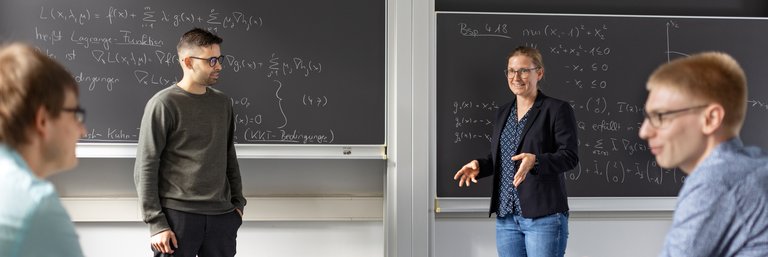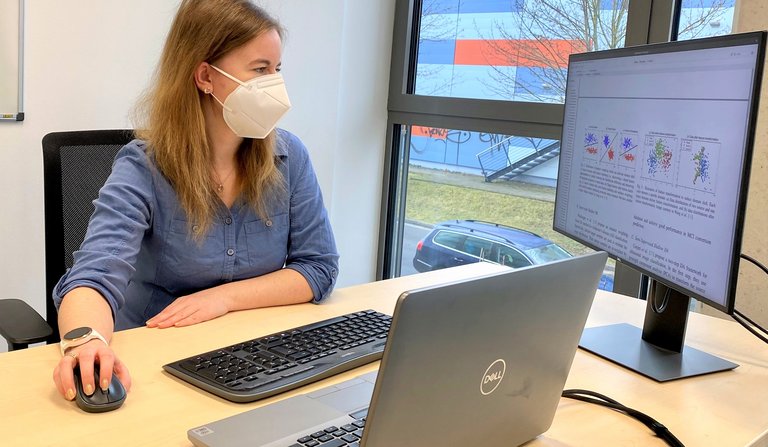Studying mathematics at TU Ilmenau provides students not only with a very solid basic knowledge of mathematics, but also with knowledge of mathematical modeling, computer science and a non-mathematical subject, and trains problem-solving-oriented thinking. But where exactly can you go after graduation? To answer these questions, mathematics professor Gabriele Eichfelder invites mathematicians once a semester to report on their everyday professional life. One of them is Dr. Julia Fligge-Niebling. The TU Ilmenau graduate now works at the German Aerospace Center (DLR) in Jena in the field of data analysis and intelligence. UNIonline talked to the two about their love of mathematics and their different career paths.

Mathematicians are considered to be particularly perceptive thinkers. Did you yourself stand out as a child because of your special analytical thinking ability?
Dr. Fligge-Niebling: The first time I realized that I was different from my classmates in this respect was in the 4th grade, when I won the so-called Kangaroo competition. However, my mother as an elementary school teacher also encouraged me very early on by giving me puzzle books, for example, which I solved with enthusiasm. In high school, I actually stood out in ethics classes when it came to philosophical questions. I often argued very logically and objectively, which my teacher at the time thought was quite good. Unfortunately, I can no longer remember exactly what I was thinking about at the time.
Prof. Eichfelder: I didn't have a key moment like that or a corresponding family background, mathematics just always came so easily to me. That's why I chose mathematics for my studies.
Dr. Fligge-Niebling: The beauty of mathematics is that everything is so logical.
Is that why you also decided to study mathematics?
Dr. Fligge-Niebling: In math class, we always learned how to solve a problem, but not why - but that's exactly what interested me! I love logical thinking and also considered studying computer science, both programs have something of the other subject in them. But mathematics appealed to me even more. I chose Ilmenau because I wanted to stay in Thuringia and I liked the Study Information Day and the talks there best.
Did you already have a concrete job description in mind back then?
Dr. Fligge-Niebling: No, not really. I always knew that many doors would be open to me after graduation and that I would know over time which topics I was most interested in.
Prof. Eichfelder: Not knowing what exactly you can do with a mathematics degree actually almost kept me from studying at the time. I only ever thought about banking or insurance, and it was clear to me that I didn't want to go in that direction. Everyone told you that mathematicians could work anywhere and do anything, but I didn't know what all that was. All I knew was that I would enjoy my studies.

How did you eventually end up in your current field of work?
Prof. Eichfelder: For me, it was the diploma thesis, the creative work on a scientific topic, which completely inspired me. I simply didn't want to move away from that, and I continued along this path, step by step, through my doctorate to my habilitation.
Dr. Fligge-Niebling: I spent more than nine years in Ilmenau and did my doctorate in optimization, an area of application-oriented mathematics that plays an important role in many areas such as business, logistics and production, but also in everyday life. Even though I really liked it here, I wanted to see something different, but stay in research. So it was ideal that the German Aerospace Center was looking for someone for the Institute of Data Science in Jena at the time. My research profile was not 100% ideal, but as a mathematician with an optimization background, you quickly get into topics like deep learning and machine learning. The process of how a deep neural network learns from data is really just running an optimization procedure. Many other problems in machine learning can also be modeled and solved as optimization problems.

Data science is a big topic right now. What does your day-to-day work as a mathematician look like?
Dr. Fligge-Niebling: As head of a research group, I no longer deal with mathematics on a daily basis. But we still need a lot of mathematics for our research work at DLR, especially from stochastics, analysis and optimization, in order to understand the various methods or to develop new algorithms ourselves. I also like to work out new topics with my colleagues that I didn't know much about before.
Prof. Eichfelder: The mathematics behind data science is indeed a very challenging one - people working in this field need to have a very broad and at the same time very deep knowledge of mathematics. That's why we are currently establishing a new professorship in Mathematics of Data Science at TU Ilmenau, and aspects of data science will in future be incorporated into existing degree programs such as electrical engineering, mechanical engineering and biomedical engineering, as well as into a new degree program in Data Science for Engineering.
With the lecture series "Mathematics in Practice", you would like to provide early insights into possible career fields for mathematicians. What other career fields could these be?
Prof. Eichfelder: For example, we have already had lectures on the optimization of steel production, flight path planning, the optimal utilization of gemstones, medical technology applications, automation in retail, mathematics in pharmaceutical research, and we've even had lectures by management consultants at our university.
What other opportunities do students at TU Ilmenau have to gain practical experience during their studies?
Prof. Eichfelder: In the 6th semester, our students can take a course in which we present modeling applications. For example, I show how to cluster data for magnetic resonance imaging. In addition, we always include such practical application examples in our lectures.
Dr. Fligge-Niebling: I would recommend every student to get a taste of what it's like to work in one of the many companies or institutes around the university, either as an intern or as a student assistant. Unfortunately, I missed out on this. Even if you don't immediately need the theorems from your studies, it's important to know that you can really do a lot as a mathematician - as flat as the saying "As a mathematician you can become anything" is: With analytical and logical thinking skills and basic knowledge of mathematics from your studies, you can really get far these days.

